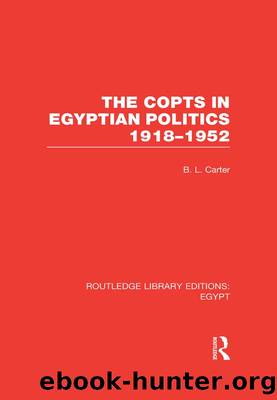The Copts in Egyptian Politics (RLE Egypt by B.L. Carter

Author:B.L. Carter [Carter, B.L.]
Language: eng
Format: epub
Tags: Reference, General
ISBN: 9780415811248
Google: s-URcF1Cg2UC
Publisher: Routledge
Published: 2012-11-23T03:43:04+00:00
B. THE LIBERAL CONSTITUTIONAL PARTY
This party, with less organisation and appeal than the Wafd, was, in the words of one wit, âa General Staff without an armyâ.127 The Liberals began with worthy convictions but were always rather half-hearted about expressing them in public;128 they eventually seemed to grow half-hearted about the convictions as well.
The party grew out of the 1921 Adli-Zaghlul split; its founders backed the former and saw themselves as sensible moderates combating the alarming extremism of the Zaghlulists. Four Copts were elected to the party's Executive Committee at its founding in 1922: Ilyas Awad; Tawfiq Dus, who brought his two brothers into the party; Salib Sami, and Amin Khayyat, a relative of George. Abadir Hakim, a landowner, and Qalini Fahmi also joined the party at its inception but were never members of the Executive. The latter was a Liberal for only a very short time. Kamil Bulus, an umdah , landowner and former member of both the Wafd Central Committee and the Union Party, was elected to the Liberal Executive in 1926, perhaps as a replacement for Tawfiq Dus. By 1935, all these men had left the party. The only Copt to play an important role after this date was Shafiq Bey Sidum Ilyas, a former member of the Shab party, who was a senator and a member of the Liberal Parliamentary Committee from 1938â46. By the latter year, even he had defected to the Wafd.
Although the Copts had good reason for their lack of interest in the party, the main point illustrated by these defections is the weakness of party loyalty. Opportunism explains many shifts in party membership. It certainly accounts for the resignation of Tawfiq Dus in 1925. Dus, a minister in the Liberal-Unionist government of 1925, came increasingly under Palace influence and was unhappy when his party insisted he resign, along with other Liberal ministers, over the Shaikh Ali Abd al-Raziq affair.129 This coalition had never been an easy one and, once before, Dus had managed to preserve it when the other Liberal ministers threatened to resign over the Unionist abuse of government machinery for party ends.130 His arguments in September were less convincing than they had been the previous July; and he, with other Liberals, was obliged to resign from the cabinet.
Not long after this, Dus submitted a conditional resignation from the party.131 His act was at least partly motivated by growing ties with the Palace. Given the Liberals' general lack of success at the polls, Dus may have felt that his political future could be better secured with royal backing. However, he seems to have maintained contacts with Liberals, perhaps out of a reluctance to burn his bridges too soon. Both he and Salib Sami were reported in 1926 to be opposing Liberal co-operation with the Wafd. Dus finally broke with the Liberals when a Wafd-Liberal coalition was established and Zaghlul adamantly refused to grant Dus a constituency for the upcoming Chamber election.132 Dus ran as an Independent, but with Palace and government backing.
Download
This site does not store any files on its server. We only index and link to content provided by other sites. Please contact the content providers to delete copyright contents if any and email us, we'll remove relevant links or contents immediately.
| Africa | Americas |
| Arctic & Antarctica | Asia |
| Australia & Oceania | Europe |
| Middle East | Russia |
| United States | World |
| Ancient Civilizations | Military |
| Historical Study & Educational Resources |
Empire of the Sikhs by Patwant Singh(23084)
The Wind in My Hair by Masih Alinejad(5095)
Rise and Kill First by Ronen Bergman(4787)
The Templars by Dan Jones(4689)
The Rape of Nanking by Iris Chang(4211)
12 Strong by Doug Stanton(3548)
Blood and Sand by Alex Von Tunzelmann(3203)
Babylon's Ark by Lawrence Anthony(2676)
The History of Jihad: From Muhammad to ISIS by Spencer Robert(2628)
No Room for Small Dreams by Shimon Peres(2368)
Inside the Middle East by Avi Melamed(2356)
The Turkish Psychedelic Explosion by Daniel Spicer(2356)
Gideon's Spies: The Secret History of the Mossad by Gordon Thomas(2350)
Arabs by Eugene Rogan(2299)
The First Muslim The Story of Muhammad by Lesley Hazleton(2271)
Come, Tell Me How You Live by Mallowan Agatha Christie(2260)
Bus on Jaffa Road by Mike Kelly(2159)
1453 by Roger Crowley(2030)
Kabul 1841-42: Battle Story by Edmund Yorke(2029)
